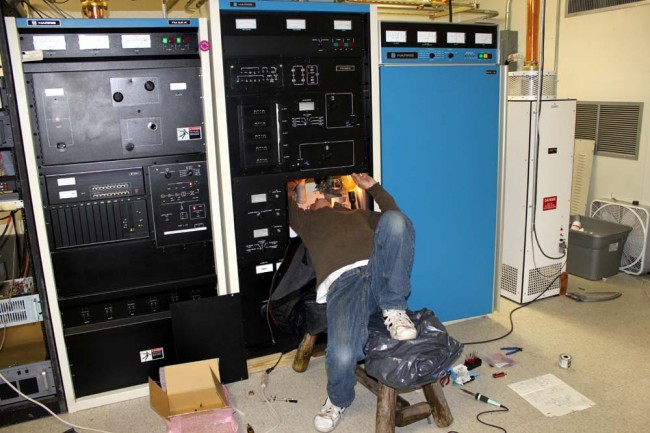This time of year is when we all sit back and assess things that we did in the past 365 or so days. It is called reflection, which is just a civilian term for SWR (Standing Wave Ratio).
Thus, I thought I would take a little time and make a few observations about the business, my part in it, and this blog.
1. The business of Radio:
Let us be honest, Radio is not what it used to be. Many times, what it used to be was somewhat of a free for all, wheeler-dealer radio station owners cutting corners and making do with less than-optimum equipment and staff. And trade, lots and lots of trade. Only in large metropolitan areas did radio stations make enough money to throw it around, but sometimes not even then. Radio was by no means a huge money-making operation and therefore, those that worked in mostly it did it as a labor of love. That may or may not have come across on the air. By far, the funniest station I ever listened to was run from a closet, with a sound reinforcement board and the program director’s CD collection. What made it so much fun was they had nothing to lose, there were no restraints placed on the staff. Once that on-air enthusiasm translated to ratings, then to revenue, the magic was gone and they were just another radio station filling a spot on the dial.
The radio business has fully transitioned from a fun, seat-of-the-pants entertainment operation to a mega money-making corporate mentality under the control of mostly non-entertainment types. Even those stations owned by smaller group owners are forced to rely on the tactics developed by the big two in order to stay in business.
Group owners will continue to extract money in whatever way they can until the money train runs off the rails. Then, radio will be replaced by something less.
2. Radio Engineering:
Engineering will continue to grow smaller, with more emphasis on computers, networking, and IT infrastructure. The future distribution of music and program material will take the form of streaming (live events), podcasts (specialty shows), and subscription services. Over-the-air free radio will become less and less relevant as younger “listeners” trend toward new media. The idea of listeners may be archaic in lieu of “subscribers” or “users.” Thus, in order to remain relevant, broadcast engineers are going to have to keep their skill sets current. I would recommend to anyone getting into the business to get current with routers, routing tables, Cisco equipment, and whatnot. The cloud is coming and will rain on all those not adjusted to the new “broadcasting” reality.
3. My part in the business:
A somewhat superannuated broadcast engineer whose skill set lies mostly within the RF and heavy-duty electrical areas, I am going back to college in January. Cisco Network Administrator is the degree I am shooting for, for that is where the local jobs, both in and out of broadcasting will be. Network Administrators are going to be the backbone of cloud computing, those that can configure routing tables will be desired.
That being said, I continue to be involved with larger RF projects and transmitter work. It is fun for me, most of the time. Having to drive two hours, one way on Christmas Eve to fix a backup transmitter, not so much, but those situations tend to be the exception, rather than the rule.
All in all, it is great fun to press the high voltage on button, not knowing if the transmitter will cycle on normally, or put on some type of display.
4. The blog:
This little thing we have here has been fun. I get a good response to most articles. I welcome all the comments and offline e-mails that come my way. My original intent, which is to provoke thought and dialog, remains unchanged. This year, I have delved into areas not covered by the trade magazines, but do have at least some bearing on radio or radio-related arts. To that end, there have been several negative responses, which is fine. I don’t pretend to know everything, if you know more, then by all means, speak up. By and large, however, the majority of responses continue to be positive.
I continue to grow the overseas audience, with roughly 36% of the page views coming from non-US IP addresses. Persons from The UK, followed by Canada, Netherlands, Australia, and Germany are the top five non-US readers of this blog.
So, I will continue to post about things in the coming year. If any of you have any suggestions or requests, shoot me an email or leave a comment.
In the meantime, have a Happy New Year!

